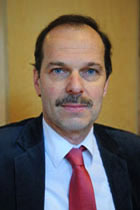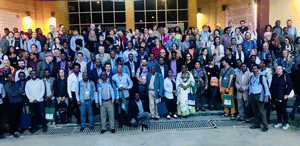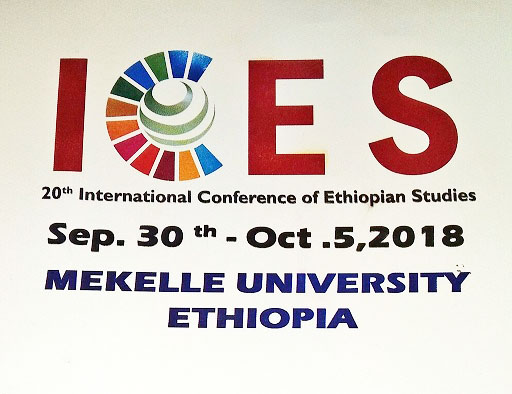Conferencing in Ethiopia: no politically correct bla-bla


Jon Abbink is Professor of Politics and Governance in Africa at Leiden University. He carries out research on the history and cultures of the Horn of Africa (Northeast Africa), particularly Ethiopia.
Ethiopia is one of the few countries in Africa that can pride itself in having an international studies conference devoted to it on a regular basis: since 1959, scholars on Ethiopia from disciplines as varied as philology, linguistics, social sciences, history, agrarian studies, and the arts (and now many more) have been meeting every three years, either in Ethiopia or abroad.
It is an African area studies conference that has gone through ups and downs in turbulent (political) times, e.g. in the 1980s, but survived. Every conference was followed faithfully by the publication of its proceedings: 18 volumes so far have appeared (although US and European authors of course worry about the low citation figures of proceedings papers). But the International Conference of Ethiopian Studies (ICES) has become an ‘institution’ and no doubt this has contributed to Ethiopia now being one of the most studied and well-known African countries. The ICES has proved its worth as rallying point of researchers from across the globe and has greatly stimulated new ideas and mutual initiatives due to its vital networking function. Also at this conference, a fixed item on the agenda, enhancing the esprit de corps of this community of scholars, was the respectful honouring of the Ethiopianists who passed away in the preceding three years since the last conference.
 Somewhat a jamboree
Somewhat a jamboree
This year the 20th ICES was held from 1 to 6 October in the booming city of Mekelle, in Tigray Regional State in northern Ethiopia. There were 587 registered participants, and despite the fact that 20-30% appeared to be absent, it was probably the largest number participants ever, giving the occasion somewhat the character of a jamboree. Two ASCL researchers participated: Azeb Amha and this author. We presented our papers in panels on linguistics and on political and governance studies.
No ‘where is the Ethiopian in Ethiopian studies’
Scientifically the 20th ICES was fairly successful in that many good and cohesive panels were held with often striking new empirical research and a younger generation presenting original work, both Ethiopians and foreigners. Here no overblown questions and politically correct bla-bla about ‘where is the Ethiopian in Ethiopian studies’: the event showed that the question would be misleading. Many, if not the majority of scholars were from Ethiopia and its diaspora, and the spirit of cooperation and exchange between Ethiopians and foreigners was dynamic and on an equal footing, and despite a sound competitive spirit, they engaged in mutually cross-fertilizing research discussions. Perhaps the field of Ethiopian studies - along disciplinary lines like history, anthropology, linguistics, philology and manuscript studies, development studies, geography, etc. - has always been strongly marked by joint projects and collaboration, appreciated from both sides. It was quite visible in this conference where in virtually all panels the presenters were ‘mixed’ and engaging in shared discourse about research findings.
 ‘Africa and the disciplines’
‘Africa and the disciplines’
An area studies conference may, however, not be the place to expect big theoretical breakthroughs. While these were not absent, the emphasis in most papers was on empirically-based work, though often of high quality. This is the eternal question of ‘Africa and the disciplines’: how has African material contributed to the general development of the disciplines? In the case of Ethiopia this impact is difficult to deny (e.g., in paleontology, archaeology, religious history, Medieval African history, ethnicity studies, languages and linguistics, or anthropology), but an ICES is usually not the place where elaborate theoretical papers are presented. However, the so-called provincialism of traditional Ethiopian studies – a reproach often made in the past – is receding, and most research presented at the 20th ICES clearly connected to predominant concerns in the disciplines.
Global developments
For example, in the panels on ‘Globalization and rural Ethiopia’, on ‘Gendering reproduction and fertility control’, on ‘Lands of the Future’ (on new forms and challenges of land use in agrarian and pastoral areas), or ‘Guardians of productive landscapes’, the context of study was that of global developments in modernization, urbanization, climate change studies, knowledge policies, and development studies. In the panel on ‘Globalization and rural Ethiopia’ it was striking to hear about the fast changes in the countryside, e.g. labour migration networks to the Middle East and Europe, cultural changes, and rapid uptake of smartphone use and ICT. With regard to the latter, the educational system and service delivery were said to be staying behind.
‘Traditional’ institutions
Some new research subjects were, e.g., the remarkable resurrection or revival (in fact, political reinvention) of the traditional age-grading system (the Gaadaa) in Oromo areas – despite the seeming impossibility to institute it in a modern society. It shows that ‘traditional’ institutions of leadership are not dead. Also much new stuff was offered on urban studies, citizenship studies, internal and out-migration flows in Ethiopia, and cultural globalization. Durable topics of research were of course climate change and environmental issues, still impacting significantly on rural societies and production patterns.

Massification of higher education
Other observations made were that from the papers presented by Ethiopians it appeared that there is a continued focus among Ethiopian students in social science on their own country: largely due to financial reasons, virtually no one goes for her/his MA to another African country for field research or a project. Only PhD students may go, but then many do not come back. Ethiopia’s higher education has grown enormously, including the development of local PhD programs, but the massification of higher education has also led to the production of a growing army of academic unemployed (many BA holders), because the local economy’s absorptive capacity is quite limited.
Very visible economic growth
The ICES 20 took place in a rapidly changing Ethiopia: political transition, economic growth, urbanization, unmitigated population pressure, irregular weather patterns and environmental concerns. Notably in the urban domain there is very visible economic growth, with massive investments in real estate, hotels (very luxurious ones), restaurants, retail businesses; shops, malls, and FDI (foreign direct investments) picking up again. A very rich economic elite in Addis Ababa and other big cities is also in evidence.
National unity in diversity
Encouraging was the positive atmosphere around the new Ethiopian PM Abiy Ahmed (an Evangelical Protestant), who has wrought significant changes in a short period and brought a wave of hope. But big challenges remain in this transition time, with even rumours of physical threats against him and his team of reformers. Worrying was the deadly ‘ethnic’ unrest across the country, with dozens of people killed, and tens of thousands displaced (IDPs) in the past weeks and months. There is mayhem, seemingly caused partly by conservative, self-appointed ethnic elites who do not want their position threatened and who do not tune in to the new PM’s discourse of unity, forgiveness, breaking down group identity walls, and re-emphasizing national unity in diversity. All-in-all, interesting times in Ethiopia.
Top photo: from the conference website.
Upper photo: group photo from Twitter account Prof. Kindeya Gebrehiwot, President Mekelle University @DrKindeya
Middle photo: conference banner.
Lower photo: scene from the conference's cultural programme. Photo: Jon Abbink.
This post has been written for the ASCL Africanist Blog. Would you like to stay updated on new blog posts? Subscribe here! Would you like to comment? Please do! The ASCL reserves the right to edit, shorten or reject submitted comments.

